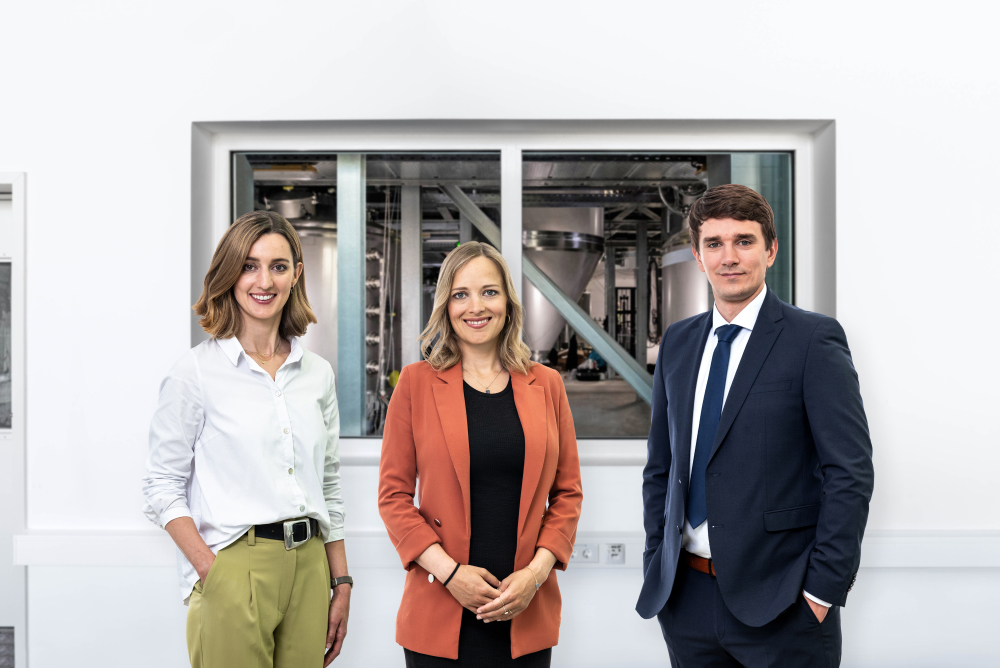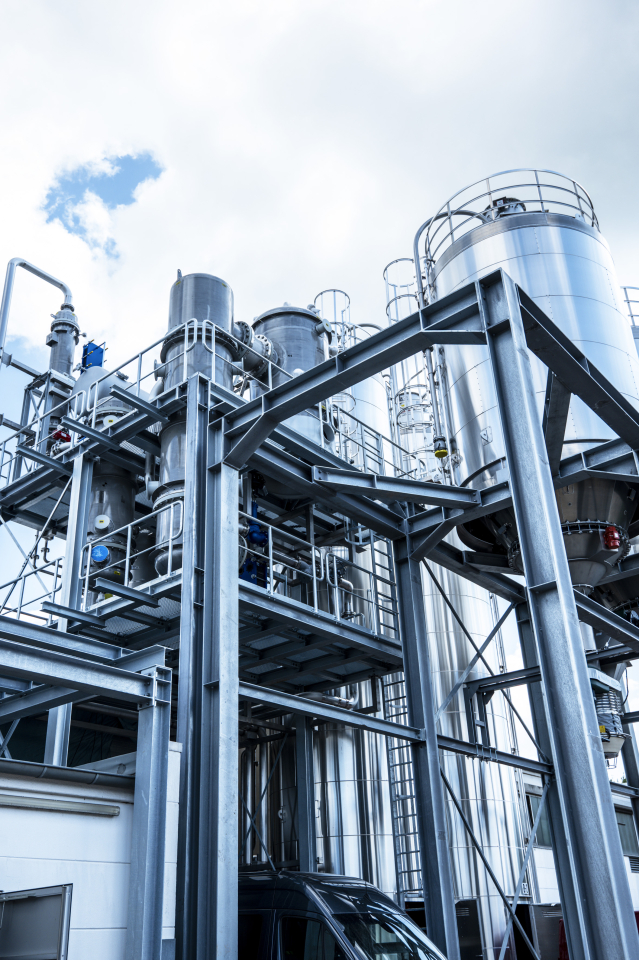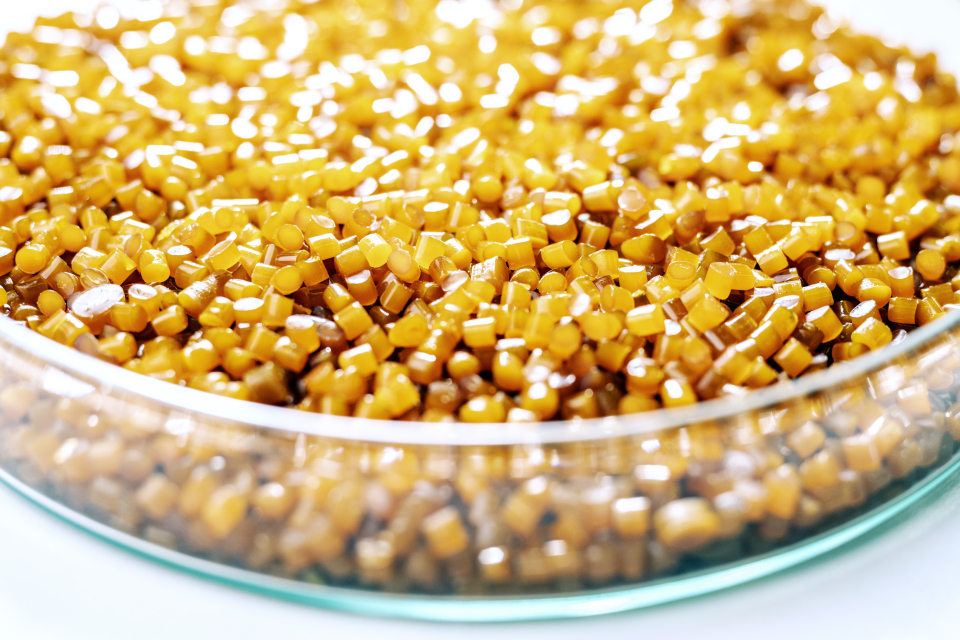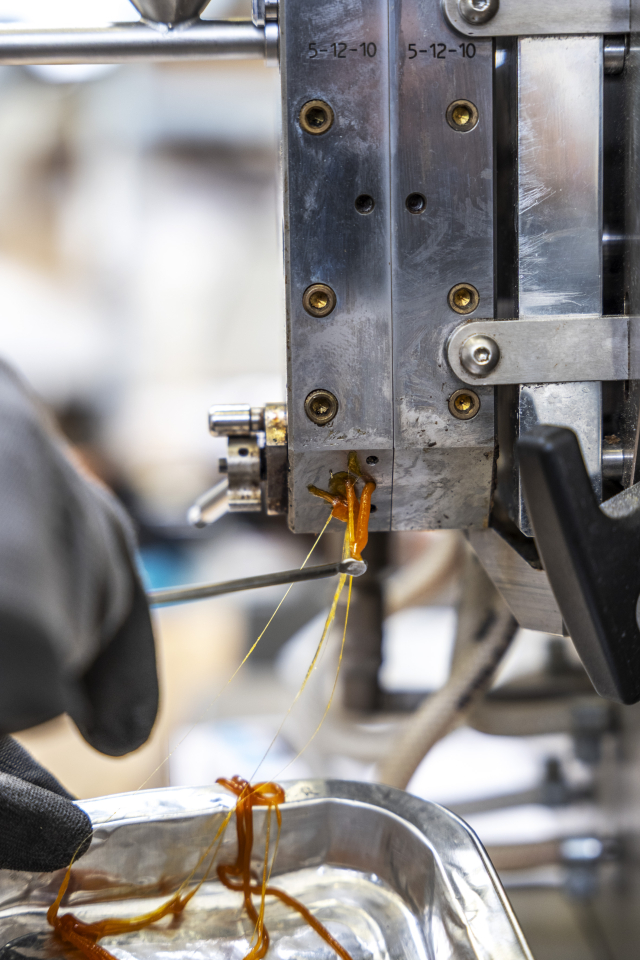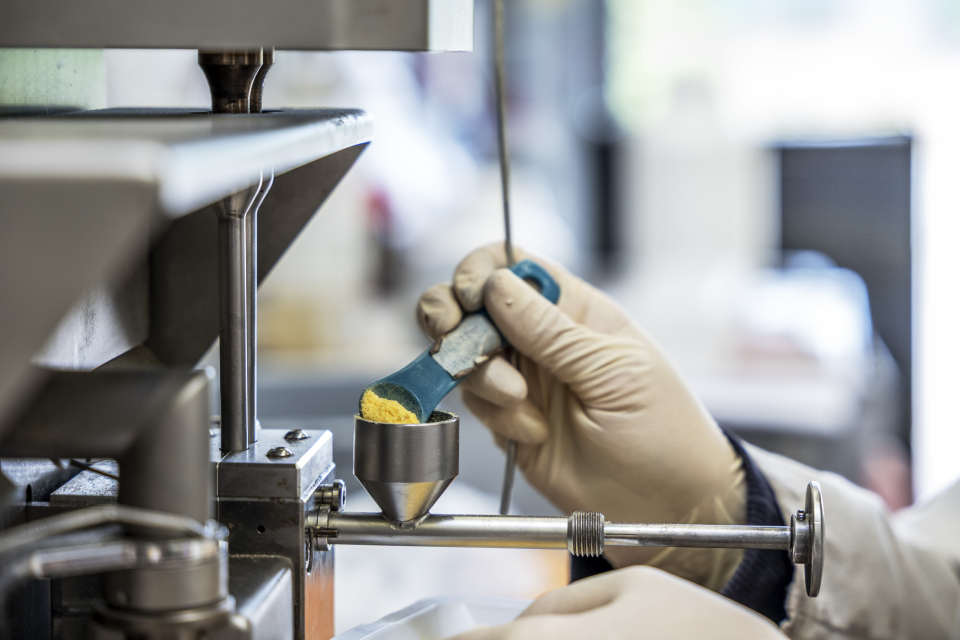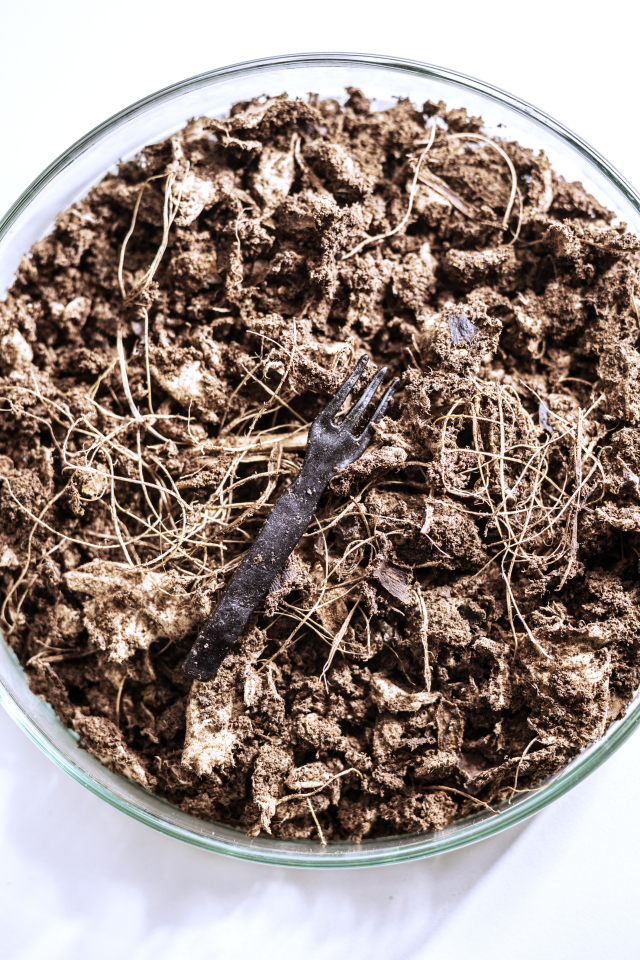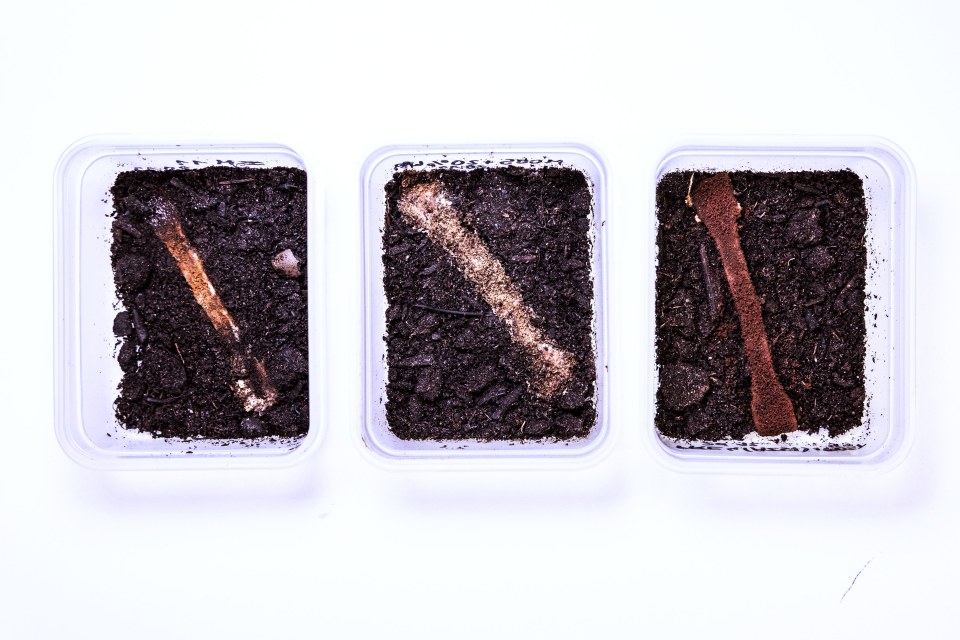Nominee 2025
Biomass instead of microplastics
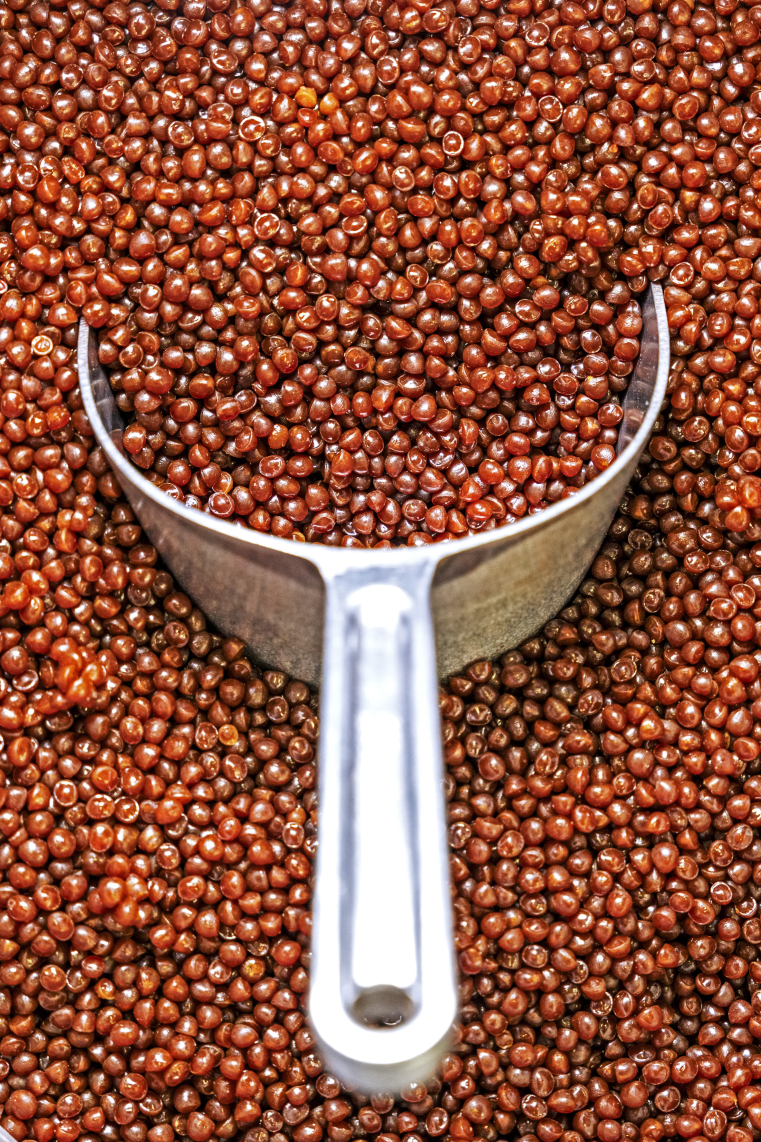
To understand why this is far from trivial, we need to look back to the very beginnings of life on our planet. From the moment life emerged, nature has relied on a perfect recycling system. It builds complex molecules from carbon atoms, links many of these molecules together to form organic polymers, and from these creates the structures of plants and animals. When they die, microorganisms break these structures back down. The carbon they contain is released into the atmosphere as carbon dioxide, taken up again by plants, and rebuilt into organic molecules and polymers — and the cycle begins anew.
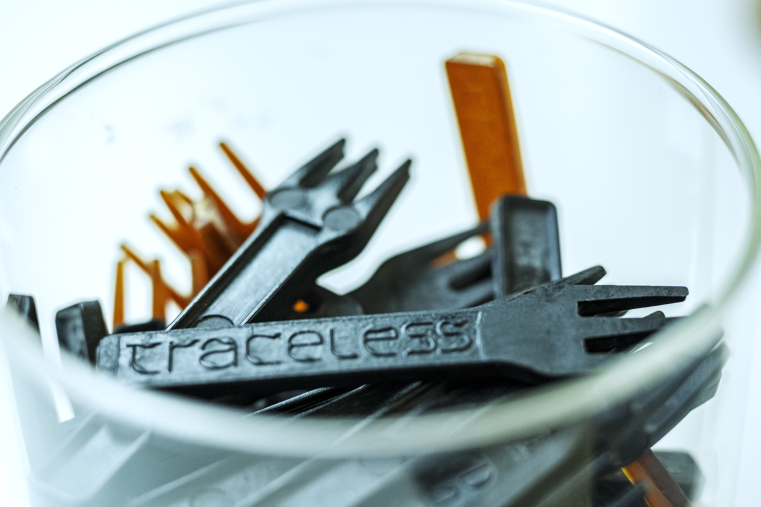
Why this system has been working for billions of years is no secret: nature only builds molecules from carbon that it can break down again with the help of microorganisms. It's perfect recycling.
More Details
Resume
Dr.-Ing. Anne Lamp
13.03.1990
Born in Hamburg, Germany
2009 – 2012
B.Sc. in Process Engineering, Hamburg University of Technology, Germany
2010 – 2014
Beiersdorf AG: Working Student R&D
2012 – 2015
M.Sc. in Process Engineering, Hamburg University of Technology
2015 – 2020
PhD in Process Engineering, Hamburg University of Technology, German
Institute of Environmental Technology and Energy Economics, TU Hamburg: Research Scientist & Team Leader2015 – 2020
VERBIO Vereinigte BioEnergie AG, Project Engineer R&D
2020 – 2021
VERBIO Vereinigte BioEnergie AG, Part-Time Leader R&D
Since 2020
traceless materials GmbH, CEO & Co-founder
Patents
8 patents
Publications
Isci, A., Erdem, G.M., Elmaci, S.B., Sakiyan, O., Lamp, A., Kaltschmitt, M. Effect of microwave-assisted deep eutectic solvent pretreatment on lignocellulose structure and bioconversion of wheat straw. Cellulose (accepted 2020).
Lamp, A., Kaltschmitt, M., Lüdtke, O. Protein recovery from bioethanol stillage by liquid hot water treatment. Journal of Supercritical Fluids, 155 (2020), 104624.
Lamp, A. Protein recovery from bioethanol stillage in the context of integrated biorefineries. ProcessNet Jahrestagung 2018, Aachen, Germany, 12-13 September 2018. Published in Chemie Ingenieur Technik, 90 (2018), 9, 2018.
Lamp, A., Kaltschmitt, M., Lüdtke, O. Improved HPLC-method for estimation and correction of amino acid losses during hydrolysis of unknown samples. Analytical Biochemistry, 543 (2018), 140-145.
Dieckmann, C., Lamp, A., Schmidt, L.M., Andersen, L., Baetge, S., Kaltschmitt, M. Von der Biogasanlage zur Bioraffinerie – Perspektiven für zukünftige Biogasanlagenkonzepte. Zeitschrift für Energiewirtschaft, 42 (2018), 3, 235-256.
Andersen, L., Lamp, A., Dieckmann, C., Baetge, S., Schmidt, L.M., Kaltschmitt, M. Biogas plants as key units of biorefinery concepts: Options and their assessment. Journal of Biotechnology, 283 (2018), 130-139.
Schmidt, L.M., Andersen, L., Dieckmann, C., Lamp, A., Kaltschmitt, M. The Biorefinery Approach. In: Meyers R. (Hrsg.) Encyclopedia of Sustainability Science and Technology. Springer, New York, NY, 2018.
Further activities
2020
Planet A Ventures GmbH: Advisor for the development of an automated impact analysis tool for startups
2020
Cirplus GmbH: Advisor for material circularity, recyclate quality and certifications
2014 – 2020
Cradle To Cradle NGO: Founder and group leader regional group Hamburg
Honors and Awards
2022 + 2023
Capital "Top 40 under 40"
Company Awards
KPMG Award 2025
CHEManager Innovation Pitch of the Year 2024
Deutscher Nachhaltigkeitspreis / Next Economy Award: Winner 2022, Nominee again in 2025
Deutscher Gründerpreis 2022, Winner Startup Category
Wissenschaftspreis 2022 Best Startup
Sina Spingler
18.10.1990
Born in Hamburg, Germany
2010 – 2014
B.Sc. in Industrial Engineering (integrated degree program), Nordakademie Business School, Elmshorn, Germany
Mankiewicz Gebr. & Co. GmbH & Co. KG, Trainee, integrated degree student, Hamburg, Germany2012 – 2012
Semester Abroad, UCES, Universidad de Ciencias Empresariales y Sociales, Buenos Aires, Argentina
2014 – 2016
Mankiewicz Gebr. & Co. GmbH & Co. KG, Project Engineer, Hamburg
2016 – 2017
Mankiewicz Gebr. & Co. GmbH & Co. KG, Project Manager, Charleston, SC, USA
2017 – 2019
M.BA (full-time), ESADE Business School, Ramon Llull University, Barcelona, Spain
2018 – 2018
MBA MACH Intern: Industry Solution Expert – Government, Berlin, Germany
2019 – 2022
Microsoft Deutschland GmbH, Customer Success Manager, Business Applications, Hamburg
2022 – 2023
Microsoft Deutschland GmbH, Customer Success Lead Business Applications, Hamburg
2023 – 2025
traceless materials GmbH, Head of Operations
Since 2025
traceless materials GmbH, Managing Director, COO
Honors and Awards
Esade Women in Leadership Scholarship
Company Awards (traceless materials GmbH)
KPMG Award 2025
Deutscher Nachhaltigkeitspreis, Kategorie Produkt (German Sustainability Award), Nominee 2025
CHEManager Innovation Pitch of the Year 2024
Innovation Award "Renewable Material of the Year 2023", 3rd prize
Deutscher Nachhaltigkeitspreis / Next Economy Award: Winner 2022
Deutscher Gründerpreis 2022, Winner Startup Category
Hamburger Gründerpreis 2022, Winner Startup Category
German Startup Awards, Female Newcomer of the Year 2022
Wissenschaftspreis 2022 Best Startup
1. Platz in Germany's Top 50 Start-Up Ranking 2021
Falling Walls Venture, Science Breakthrough Of The Year 2021
Darboven IDEE Förderpreis, 1st prize 2021
Green Alley Award, Winner 2021
Impact Festival Award for Hardware Solutions, Winner 2021
Hello Tomorrow Global Challenge, Finalist 2021
Biopolymer Innovation Award, 2nd 2021
Future Hamburg Award, 2nd 2021
C-Voucher Award, 2nd 2021
Advanced Materials Competition, Winner 2020
Niklas Rambow
18.10.1990
Born in Stade, Germany
2009 – 2013
Bachelor of Engineering “Composites”, Private University of Applied Sciences, Stade, Germany
2103 – 2019
Premium AEROTEC GmbH, Project Engineer “Site Planning”, Nordenham, Germany
2019 – 2021
Premium AEROTEC GmbH, Agile Team “Hangar 100”, Nordenham
Since 2021
traceless materials GmbH, Head of Technology Development, Hamburg, Germany
Further Activities
2019-2020
IBIS Interkulturelle Arbeitsstelle e.V. – Voluntary work as a certified integration assistant for refugees
Honors and Awards
2018
Dean’s List of Academic Excellence, University of Sydney
Company Awards
KPMG Award 2025
Deutscher Nachhaltigkeitspreis, Kategorie Produkt (German Sustainability Award), Nominee 2025
CHEManager Innovation Pitch of the Year 2024
Innovation Award "Renewable Material of the Year 2023", 3rd prize
Deutscher Nachhaltigkeitspreis / Next Economy Award: Winner 2022
Deutscher Gründerpreis 2022, Winner Startup Category
Hamburger Gründerpreis 2022, Winner Startup Category
German Startup Awards, Female Newcomer of the Year 2022
Wissenschaftspreis 2022 Best Startup
1. Platz in Germany's Top 50 Start-Up Ranking 2021
Falling Walls Venture, Science Breakthrough Of The Year 2021
Darboven IDEE Förderpreis, 1st prize 2021
Green Alley Award, Winner 2021
Impact Festival Award for Hardware Solutions, Winner 2021
Hello Tomorrow Global Challenge, Finalist 2021
Biopolymer Innovation Award, 2nd 2021
Future Hamburg Award, 2nd 2021
C-Voucher Award, 2nd 2021
Advanced Materials Competition, Winner 2020
Contact
Coordination and Press
Ivonne Sokoll
Head of Marketing
traceless materials GmbH
Großmoorbogen 7a
21079 Hamburg
Mobile: +49 (0) 151 / 55 42 71 84
E-Mail: ivonne.sokoll@traceless.eu
Web: www.traceless.eu
Spokesperson
Dr.-Ing. Anne Lamp
Geschäftsführerin
traceless materials GmbH
Großmoorbogen 7a
21079 Hamburg
Mobile: +49 176 (0) / 44 25 77 17
E-Mail: anne.lamp@traceless.eu
Web: www.traceless.eu
A description provided by the institutes and companies regarding their nominated projects
Biomass instead of microplastics – innovative biomaterials replace fossil plastics
Tracing global plastic pollution is the mission of traceless materials®. The innovative biomaterial traceless® and its production process are the result of co-founder and CEO Anne Lamp's doctoral thesis at the Technical University of Hamburg and are a showcase product for a climate-friendly and circular bioeconomy.
The traceless® material is obtained from plant residues from the agricultural industry in a resource-saving process and can replace fossil-based plastics in products that are difficult to recycle or easily end up in the environment. With this innovation, traceless® is a global pioneer of innovative natural polymers, going far beyond familiar material categories such as plastics or bioplastics:
In contrast, traceless® is fossil- and plastic-free, based on rapidly renewable biomass residues, and is compostable in a short time. The natural polymers in granulate form are already being produced in the company's own plant. On the road to industrialization, the first large-scale production plant will open in Hamburg in fall 2025. This material innovation thus offers the potential to contribute to solving the global plastic waste problem and to establishing a climate-neutral, recyclable industry. As a cleantech technology, it helps to secure global competitiveness, future-proof industrial jobs, and reduce dependence on fossil raw materials.
State of the art and new material category: natural polymers traceless® is shaping a new generation of natural polymer materials. It is based on the use of natural polymers—long-chain molecules that have similar properties to plastics but are naturally occurring and not synthetically or artificially produced. Examples of so-called natural polymers include cellulose, lignin, alginates, natural fats, and proteins. The traceless material is produced using a resource-conserving, energy-efficient production process ( ) that extracts these natural polymers.
Although natural polymers were at the beginning of the history of plastics, they fell into oblivion with the advent of fossil raw materials and the chemical industry and have been little researched and hardly used commercially in recent decades. In view of the aggravating plastic pollution, innovations relating to natural polymers are now emerging again worldwide. traceless® is a pioneer and leader both in the EU and globally, and will be the first company to implement a comparable extraction process on an industrial scale.
Existing collaborations
traceless is cooperating with renowned European brand providers and manufacturers to develop product applications. The team has been working with e-commerce retailer OTTO on the development of plastic-free shipping bags since 2020. A first pilot product in the packaging sector has been successfully tested on the market with fashion retailer C&A since 2022. In 2024, French fry forks made from traceless® material were used for the first time at a series of large outdoor concerts in cooperation with international catering provider Aramark. In the same year, a collaboration with the Mondi Group, a leading international paper and packaging manufacturer, was announced. Mondi uses the traceless® material as an alternative to conventional paper coatings, where plastics improve the sealing and barrier properties of the paper. At the same time, recyclability for existing paper recycling cycles is ensured.
Regulatory classification
As a pioneer of innovative natural polymer materials, traceless also offers regulatory advantages. Since the material is based on natural polymers that are neither chemically modified nor synthetically polymerized, traceless is not a plastic in the regulatory sense, but a natural substance. It is therefore not subject to laws aimed at reducing single-use plastics, such as the EU Single-Use Plastics Directive. This makes it currently the only thermoplastic material alternative for products such as cutlery or drinking straws that can no longer be made from single-use plastic or for which high taxes apply in the case of plastic. For customers, traceless is therefore a regulatory-compliant, easy-to-integrate, and sustainable choice in all product areas where a complete switch to reusable products is not yet feasible.
Future prospects
traceless® makes a substantial contribution to solving global plastic pollution, the resource crisis, climate change, and biodiversity loss. As biomaterial pioneers, they are driving the green transformation of the materials sector. This benefits not only the planet, but also the economy and society: Scaling the innovation to an industrial level will help secure German and European competitiveness and make Germany a technology leader in the bio-based industry. This is in line with the goals of strategically reducing fossil fuel dependencies, establishing a net-zero circular economy, and attracting sustainable cleantech industries to the region in the long term.

 Gebärdensprache
Gebärdensprache
 Leichte Sprache
Leichte Sprache


